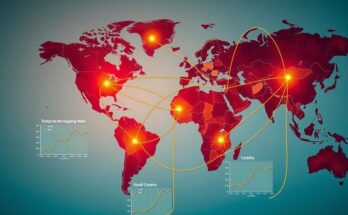President Trump’s economic policy reflects the principles of the Chicago School of Economics, emphasizing market-driven solutions like tariffs to foster fair trade and national industry growth. By contrasting sharply with progressive ideologies, Trump’s strategy highlights the importance of competitive markets and negotiating skills, showcasing a deeper economic philosophy rooted in practical applications rather than legalistic frameworks. This positioning lays the groundwork for ongoing debates about the future of U.S. economic policy.
The Chicago School of Economics, famed for its potent influence on American economic policy, underpins many aspects of President Trump’s strategy. Milton Friedman, a staunch advocate of economic and political interplay, famously declared, “There is an intimate connection between economics and politics, and only certain combinations of political and economic arrangements are possible.” This sentiment echoes throughout Trump’s approach, marked by a reliance on competitive markets and tariffs instead of government oversight, revealing how Chicago’s principles have shaped his fiscal agenda. While Trump’s economic tactics are marked by Chicago-style pragmatism, the progressive agenda appears more ideologically driven, often rooted in legal frameworks rather than solid economic theory. The progressive left’s reluctance to acknowledge Trump’s reliance on market incentives highlights a significant divide in economic philosophy. For instance, by advocating for tariffs, he aims to ensure fair trade practices and protect American jobs, countering predatory tactics employed by foreign nations, such as technology theft and product dumping. In the realm of international trade, Trump’s policies draw on historical examples, like the Chicago Boys in Chile, who revitalized a stagnant economy by embracing market-driven approaches and privatization. Trump’s insistence on revitalizing the U.S. semiconductor industry, along with other vital sectors, underscores his economic acumen and understanding of national security implications tied to economic independence. The contention between business-centric economics and a legalistic approach highlights a broader societal debate. Trump’s administration seeks a return to business fundamentals — the art of negotiation, market trust, and adaptive trade strategies — rather than bureaucratic control, reminiscent of the Chicago School’s teachings. Hence, Trump’s economic methods emphasize fostering competitive vigor through targeted tax reductions and strategic tariffs to reinvigorate American industries. In conclusion, Trump’s economic philosophy mirrors the Chicago School’s ethos, intertwining politics and economics with a vision of competitive markets as the cornerstone of national prosperity. The challenge remains for future leaders to navigate these principles judiciously, ensuring that America does not fall prey to economic complacency or overregulation. In a world increasingly reliant on international partnerships, the balance of competition and cooperation may well define the future of economic policy.
The University of Chicago’s economics department has long been a powerhouse of economic thought, shaping policy debates through its promotion of free markets, competition, and rational behavior. Milton Friedman, a key figure from this institution, argued for a close relationship between economics and politics, emphasizing that effective policies arise from understanding this interplay. The tension between progressive economic approaches, which often lean on regulatory frameworks, and those grounded in Chicago’s principles illustrates a broader ideological divide shaping current economic discourse and policy formulations in the U.S.
In summary, Trump’s economic strategies are firmly anchored in the principles of the Chicago School, advocating for market-based solutions and strategic trade practices. This approach counters the progressive inclination towards regulatory measures, highlighting the necessity for a more competitive economic landscape in America. As these philosophies collide, the future of U.S. economic policy will hinge upon balancing innovative market incentives with necessary oversight to foster sustainable growth and prosperity.
Original Source: www.mindingthecampus.org


